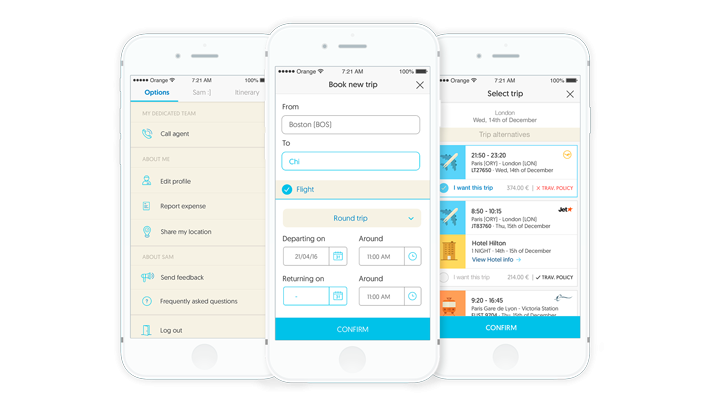How have corporate booking tools evolved?

Tools for tomorrow
Broadly speaking, business travellers want to be able to access a wide range of content, in a simple way and in the channels they choose. It’s up to travel management companies, suppliers and technology partners to find ways to do this in the complex environment in which they operate.
The first sign of real acknowledgement of changing traveller behaviour was Concur’s move in 2014 to enable TripLink users to book Airbnb content. Fast forward to today and everybody is finding ways to integrate everyone else from Uber and Starbucks to third party fare alert technology, loyalty programmes and insurance providers.
There are different approaches from various parts of the industry. This includes the creation of marketplaces to access content from 'third parties’, or whole platforms dedicated to traditional accommodation as well as new entrants.
The push from travellers to access content similar to what they consume when they travel outside of work is one factor driving change. But the change has been driven to a greater extent by the need of managers to bring this content into the corporate ecosystem. This encourages travellers’ compliance to travel policy so that spend data can be collected and duty of care obligations fulfilled.
"The industry will gradually migrate beyond just making sure the buttons are in the right place"
Michel Rouse, Chief Technology Officer, EMEA, FCM Travel Solutions
A better user experience
Alongside the push for wider content, there’s also a desire for a better user experience. Corporate travel managers have recognised the challenge of getting their travellers to adopt systems which inherently aren’t user-friendly and akin to what they use for leisure travel. The response from both TMCs and technology providers has been fewer clicks to booking, stored profiles so information needs to be entered only once, the ability to amend bookings easily, and more information to help travellers make a quick decision.
Michel Rouse, Chief Technology Officer, EMEA, for FCM Travel Solutions believes TMCs need to be considering the user experience. He sees increasing demand for simple solutions that enable content to be booked as simply as possible, or even actively proposed based on the context.
Research released last December by the Global Business Travel Association, supported by SAP Concur, reveals that more than 66% of business travellers in Europe have booked with an online travel agency or directly with a supplier.However, the research also reveals that business travellers plan to use their online booking tool more often in 2019. This could be a nod to the improved access to content as well as moves by providers to enhance the experience.
One recent development around the user experience is the incorporation of timely messages tailored to company policy, preferred suppliers and traveller preferences. These notifications can pop up throughout the travel journey (from planning to post-booking) and can inform the traveller if there are more optimal solutions available, such as a preferred supplier hotels, or if they might not be within budget.
Using the right channels
The third area where there has been significant development is in the channels with which travellers choose to engage. The industry has already seen a massive shift to mobile; although the actual booking of corporate travel is still catching up, itinerary management and other elements around the trip such as ground transportation and expense capture are increasingly carried out via mobile devices.
Michel Rouse believes traditional self-booking tools are being challenged as the primary booking service. He says that some companies are moving to an open booking model, while other emerging channels such as chatbots and the role of artificial intelligence are garnering interest. “Existing tools are still relevant and will be for quite a while. We need to work with them because of the corporate policies and processes that are tied in. Also, some travellers are more comfortable with these tools than a mobile application.”

He adds that the industry will gradually migrate to different channels such as WhatsApp and WeChat and “beyond just making sure the buttons are in the right place”.
In the short to medium term, a balance between traditional self-booking tools with improved user interfaces and more content and emerging channels is what we’re likely to see. Rapid change might appease millennial travellers coming into the workforce but it might also leave some travellers behind.
TMCs are therefore more likely to adopt an omni-channel booking model offering consistent content and service across different channels. Rouse says that FCM’s strategy is to focus on the experience throughout the entire travel journey or workflow rather than the individual technology components.
Going forward, Rouse sees a blending of portal, mobile and online booking tool into a single user experience. At the front end, users get a seamless experience with the right technology for the task working in the background.
A hybrid of the human touch combined with the latest technology is also likely. Research from Travelport published earlier this year shows travellers are happy with a blend of digital services and human intervention. They see live chat services as the perfect conduit for a blended approach, but acknowledge that accessing information via current mobile technologies can still be “painful”.
The future of booking corporate travel
The vision for booking corporate travel will continue to be more simplicity, wider content and integrated services, all accessible in one place, regardless of the channel of access or the device be used. These are probably the only elements that will remain constant and the industry will have to adapt around them.
Websites may become obsolete as travellers run their lives from a chat platform or search engine accessing all the services they need in their work and home lives. Or, they might turn to devices such as Google Home or Amazon Alexa and use voice technology to research and book travel.
Personalisation will also play an increasing role but not in an intrusive way. Companies and services will capture data and use it, not in a creepy way, but to make the corporate traveller’s life easier, by offering them things they know they like, will shine.
The future is bright.

